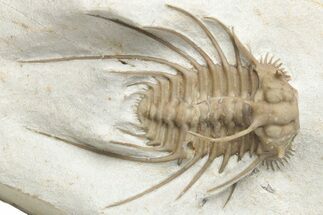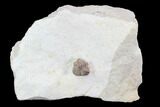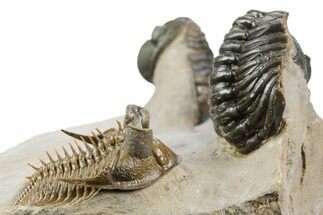This Specimen has been sold.
Enrolled Kainops Trilobite - Oklahoma
This is a beautiful, enrolled specimen of Kainops raymondi from the Haragan Formation of Oklahoma. It has amazing surface detail including the many eye facets preserved in each eye. It was prepared under microscope using air abrasives.
There is a second very similar species found in the same layers called Paciphacops. The most easily identifiable, distinguishing feature is the number of eye facets. Kainops has many more eye facets than Paciphacops does.
There is a second very similar species found in the same layers called Paciphacops. The most easily identifiable, distinguishing feature is the number of eye facets. Kainops has many more eye facets than Paciphacops does.
About Trilobites
Trilobites are an extinct class of marine arthropods that thrived for nearly 270 million years, from the early Cambrian to the end of the Permian period (around 521 to 252 million years ago). They are one of the most successful and diverse groups in the history of life, with over 25,000 described species spanning a wide range of sizes, shapes, and ecological niches. Known for their distinctive, segmented exoskeletons, trilobites provide invaluable insights into the evolutionary history of arthropods and the dynamics of ancient marine ecosystems.
Trilobites are an extinct class of marine arthropods that thrived for nearly 270 million years, from the early Cambrian to the end of the Permian period (around 521 to 252 million years ago). They are one of the most successful and diverse groups in the history of life, with over 25,000 described species spanning a wide range of sizes, shapes, and ecological niches. Known for their distinctive, segmented exoskeletons, trilobites provide invaluable insights into the evolutionary history of arthropods and the dynamics of ancient marine ecosystems.
SPECIES
Kainops raymondi
AGE
LOCATION
Black Cat Mountain, Clarita, Oklahoma
FORMATION
Haragan Formation
SIZE
.67" wide, about 1.1" long
CATEGORY
SUB CATEGORY
ITEM
#95718
We guarantee the authenticity of all of our specimens.
 Reviews
Reviews














